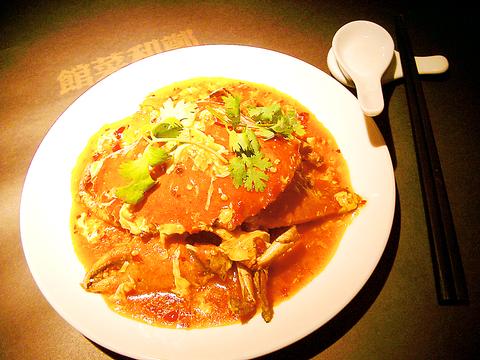Taipei has a lot of Thai restaurants nowadays. But for Malaysian and Singaporean cuisine, there are very few options, and even fewer authentic ones.
Cheng Ho aims to be the first to introduce so-called Admiral's Straits cuisine to Taiwan. Cheng Ho, the Ming-dynasty navigator, made history for his seven voyages to the Atlantic and Africa, some 100 years before Columbus set sail to America.

PHOTO: YU SEN-LUN, TAIPEI TIMES
The Strait of Malacca between Sumatra and Malaysia is where Chinese culture, brought by Cheng, met with Malaysian culture. Many believe this is where Malaysian food originates.
The restaurant's decor is modern chic, with a strong Chinese flavor. Black tablecloths and classic Chinese-style cups and spoons, coupled with mood lighting, create a coolness that contrasts with the hot and spicy food.
Live chili crab is a must-try at Cheng Ho. Crab is stir fried with chili, black beans, Malaysian prawn paste and egg -- all of which must be done within 30 seconds. It's a spicy dish made fresh by the taste of crab.
Another recommendation, especially for those seeking authentic Malaysian cuisine, is Singaporean Hainan chicken rice. The rice is something chief chef Thomas Lee (
Don't forget to add black oil, chili sauce and ginger-onion sauce to the boiled chicken, all of which are necessary for this simple but satisfying dish. The black oil is Malaysian soy sauce, according to Lee, and is thicker and richer that Chinese-style soy sauce and looks like caramel sauce. In addition to using it on the chicken rice, black oil can be used on stir fry kwey teow, a kind of rice noodle dish.
Eighteen years ago Lee pioneered Malaysian restaurants in Melbourne, Australia. Now, Malaysian restaurants are widely seen there. His restaurant in Taipei is all-you-can-eat and there are 18 kinds of dishes to choose from, such as the famous Malaysian satay (barbecue meat with peanut sauce), laksa (spicy shrimp soup with coconut milk) and baked curry prawns. There is a also buffet displaying Thai salad, Indonesian curry and tapioca desserts.

This is the year that the demographic crisis will begin to impact people’s lives. This will create pressures on treatment and hiring of foreigners. Regardless of whatever technological breakthroughs happen, the real value will come from digesting and productively applying existing technologies in new and creative ways. INTRODUCING BASIC SERVICES BREAKDOWNS At some point soon, we will begin to witness a breakdown in basic services. Initially, it will be limited and sporadic, but the frequency and newsworthiness of the incidents will only continue to accelerate dramatically in the coming years. Here in central Taiwan, many basic services are severely understaffed, and

It is a soulful folk song, filled with feeling and history: A love-stricken young man tells God about his hopes and dreams of happiness. Generations of Uighurs, the Turkic ethnic minority in China’s Xinjiang region, have played it at parties and weddings. But today, if they download it, play it or share it online, they risk ending up in prison. Besh pede, a popular Uighur folk ballad, is among dozens of Uighur-language songs that have been deemed “problematic” by Xinjiang authorities, according to a recording of a meeting held by police and other local officials in the historic city of Kashgar in

Jan. 5 to Jan. 11 Of the more than 3,000km of sugar railway that once criss-crossed central and southern Taiwan, just 16.1km remain in operation today. By the time Dafydd Fell began photographing the network in earnest in 1994, it was already well past its heyday. The system had been significantly cut back, leaving behind abandoned stations, rusting rolling stock and crumbling facilities. This reduction continued during the five years of his documentation, adding urgency to his task. As passenger services had already ceased by then, Fell had to wait for the sugarcane harvest season each year, which typically ran from

The People’s Republic of China (PRC) was out in force in the Taiwan Strait this week, threatening Taiwan with live-fire exercises, aircraft incursions and tedious claims to ownership. The reaction to the PRC’s blockade and decapitation strike exercises offer numerous lessons, if only we are willing to be taught. Reading the commentary on PRC behavior is like reading Bible interpretation across a range of Christian denominations: the text is recast to mean what the interpreter wants it to mean. Many PRC believers contended that the drills, obviously scheduled in advance, were aimed at the recent arms offer to Taiwan by the